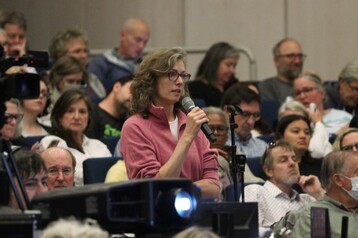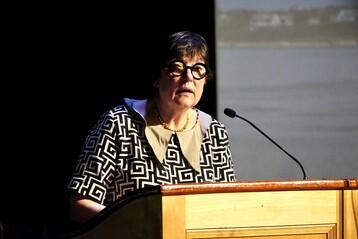Fear & Loathing At Town Meeting: Why Was Article 83 So Close And So Contentious?
Jason Graziadei •

Hillary Hedges Rayport doesn’t think the town is doing its job with respect to long range planning. Town staff and members of the Nantucket Planning & Economic Development Commission are offended at the suggestion.
In the waning hours of Nantucket’s Annual Town Meeting on Monday, that fight - one that has been brewing for several years - took center stage as sharp comments and hard feelings were on full display during the debate over Article 83.
The proposal, Rayport’s citizen petition to change the makeup of the Nantucket Planning & Economic Development Commission (NP&EDC) by adding elected seats, was ultimately approved by just a single vote: 183 to 182. And the immediate aftermath of that razor thin vote was one of the most bizarre sequences in recent Town Meeting history.
“It’s very frustrating when you see the harm that’s been done to Nantucket because of the lack of planning for the future,” Rayport said on Tuesday, the day after the vote. “The article passed and that’s all that matters…I was very happy to have the win. Whenever it’s so close, people say ‘if only my friend hadn’t run out of gas or needed to go to the bathroom.’ I had a whole bunch of friends who couldn’t be there. At the end of the day, we just have to stop trying to parse it and say a win is a win.”
While the crowd was sparse and those who remained were tired, the debate on Article 83 on Monday night sparked some of the most pointed and personal comments of the entire Town Meeting.
“Last march, the NP&EDC committed to having a master plan done and brought to Town Meeting this year - that was in March 2022 - we do not have a master plan and near as I can tell we haven’t made much progress to that objective,” island resident David Worth, the chairman and CEO of The Inquirer and Mirror newspaper, told the audience in the high school auditorium. “We should have a change in how we go about it, and we should invigorate and reinvigorate the commission with people who truly are committed to service.”
That comment prompted a few angry outbursts from town staff and elected officials at the front of the stage. Select Board member Dawn Hill Holdgate - who is an appointed member of the NP&EDC herself, then rose to object to Worth’s remarks.
“I wasn’t going to speak on this but I’m getting to the point where I’m getting pretty offended,” Hill Holdgate said. “Talking about commitment to service? I’m in my third term serving this community. The five members on the Planning Board have been elected for numerous years between all of them to serve this community. The three appointed members? I don’t know if you could pick better people than Kristie Ferrantella, Mary Longacre and Wendy Hudson to be good representatives of this community?...Every single elected official on this commission and all three appointed people have lived on Nantucket for most of their lives, run businesses here, raised children here, and having this brought by someone outside of it, who maybe wants to be a part of it, is just kind of offensive.”
Article 83 was probably among the most talked about warrant articles within the halls of Nantucket town government, but one that wasn’t necessarily looming large on the radar of the general public. It dealt with the inner workings of a relatively obscure government body with no regulatory power, and Rayport’s proposal to alter how its membership is selected amounted to inside baseball for most voters. But for the members of the NP&EDC, planning department staff members, along with Rayport and her group of supporters, it was a highly-charged topic. For them, it was personal. The members of the NP&EDC felt attacked by the proposal, as did Rayport by their pushback.
“When they don't want to talk about the issues, they attack the person,” Rayport said. “That happened in broad daylight. There was a lot of criticism of who brought this - that it was an outsider. That is offensive and prejudiced.”
Nat Lowell, who earned an automatic appointment to the NP&EDC by virtue of his election to the Planning Board, was among many who spoke out against Rayport’s citizen petition. Lowell remarked that Rayport hadn’t proposed changing two other appointed government bodies - the Conservation Commission and the Finance Committee - which have far more regulatory authority and responsibility than the NP&EDC, which is largely advisory. On Tuesday, Lowell remarked about the difficulties of having such a debate about the inner workings of the NP&EDC on Town Meeting floor.

“Town meeting wants to function like a public hearing but it can’t and because of that the voters who are not fully informed on every topic, which is impossible, can get easily swayed by deliberate or unintentional misinformation,” Lowell said. “This is an example of something that’s been turned into something it isn’t. This has been purposefully manipulated. It’s been made very confusing for the voters to understand because the proponent is determined to force this change.”
The narrow victory on Town Meeting floor came one year after Rayport’s previous and similar citizen petition was defeated. And the razor thin margin on Monday prompted a rare but not unprecedented challenge to the vote.
As cheers and jeers erupted following moderator Sarah Alger’s announcement of the voting results, she attempted to move on to the next warrant article to be discussed. But some in the audience started yelling out for a recount. That prompted Alger to say “hold on” and then walk to the front of the stage to confer with town counsel John Giorgio. After a brief conversation, Alger returned to the microphone.
“This is, of course, why we always tell people ‘do not leave,’ because it’s not over until it’s over,” Alger said. “We do not have the ability to do a recount - there’s really no such thing. We do have a motion to reconsider. So if someone in the prevailing side, that is, the yes’s, wanted to make a motion to reconsider, they would be able to do that.”
After explaining the rules and once again attempting to move on to the next article, island resident and DPW operations manager Richard Moore raised his hand to make a motion to reconsider. Article 83 supporter Charity Benz questioned whether there was proof Moore had voted in the affirmative:
“Point of order,” Benz said. “What proof is there that the person who claimed they voted for it actually did? There is no proof.”
That prompted Alger to interject: "Excuse me. We’re a community. And if this gentleman stands up and says to me that he voted in the affirmative, he sat here with his hand up, I’m taking his word for it and I am not questioning him."
So Moore's motion to reconsider proceeded. It required a two-thirds majority, and ultimately failed by a wide margin: 142-199.
Alger said Tuesday that a motion to reconsider was rare, but not unheard of.

“The whole time I was thinking ‘what difference does it make if there's a motion for reconsideration?’ It’s never going to pass,” Alger said. “You’re never going to get two-thirds to reconsider. I couldn’t see how a motion to reconsider was going to pass, so ‘no harm, no foul,’ let him make his motion.”
While she knew that Town Meeting rules precluded a formal recount, Alger said someone could have called for a paper ballot vote, and that she was unsure how she would have responded if a voter had asked for one. But in the end, no one did.
So what happens next? As a home rule petition, Article 83 must still be approved by the state legislature, a sometimes lengthy process. Lowell said the proposal still has an uphill climb despite earning Town Meeting’s approval.
“This will raise questions at the state level,” Lowell said. “As I tried to say Monday night, tinkering around with acts of the legislature needs careful thought and solid support of the town. That is hardly the case here.”
Rayport said she intends to continue fighting to pass the home rule petition in Boston, and said any effort to interfere with that effort by town officials would be “highly inappropriate.”
“I certainly hope the state legislature will approve this request for an administrative change - it would be unusual if they took a different kind of attitude,” Rayport said. “I’m going to stay on top of it and explain it. I have the right to go to hearings and talk to the legislature and I feel like I'm obligated.”
Does she think the town - given its opposition to the article - would interfere with that?
“I think that would be a coup,” she said. “Town Meeting is the authority for the town and that needs to be respected. If folks get involved and try to derail what Town Meeting says, that is highly inappropriate.”